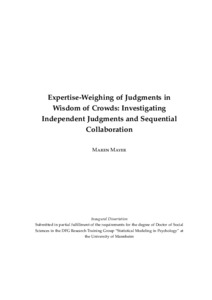|
Expertise-weighing of judgments in wisdom of crowds: Investigating independent judgments and sequential collaboration
Mayer, Maren
![[img]](https://madoc.bib.uni-mannheim.de/63110/1.hassmallThumbnailVersion/dissertation.mayer.final.pdf)  Vorschau |
|
PDF
dissertation.mayer.final.pdf
- Veröffentlichte Version
Download (3MB)
|
|
URN:
|
urn:nbn:de:bsz:180-madoc-631101
|
|
Dokumenttyp:
|
Dissertation
|
|
Erscheinungsjahr:
|
2022
|
|
Ort der Veröffentlichung:
|
Mannheim
|
|
Hochschule:
|
Universität Mannheim
|
|
Gutachter:
|
Bröder, Arndt
|
|
Datum der mündl. Prüfung:
|
23 September 2022
|
|
Sprache der Veröffentlichung:
|
Englisch
|
|
Einrichtung:
|
Außerfakultäre Einrichtungen > Graduiertenkolleg "Statistical Modeling in Psychology" (SMiP)
Fakultät für Sozialwissenschaften > Allgemeine Psychologie (Bröder 2010-)
|
|
Fachgebiet:
|
150 Psychologie
|
|
Freie Schlagwörter (Englisch):
|
wisdom of crowds , sequential collaboration , statistical modeling , advice taking , information sharing , group decision making
|
|
Abstract:
|
In the past, collaboration to form an aggregate from individual judgments or preferences was mostly investigated for either wisdom of crowds or group decision making. While wisdom of crowds was typically examined by statistically aggregating independent individual judgments, group members form a consensus decision by information sharing and discussing in group decision making. Even though very different, both of these methods were demonstrated to profit from considering expert judgment in the aggregation process. However, the Internet vastly changed the way individuals can collaborate, share information, and form judgments. Large-scale online collaborative projects such as Wikipedia and OpenStreetMap rely on sequential collaboration, a process in which contributors consecutively adjust or maintain the latest versions of entries. In this thesis comprising three articles, I add to research showing that weighing independent individual judgments by expertise improves resulting estimates. Moreover, I demonstrate that sequential collaboration is a successful way of aggregating individual judgments which relies at least partially on an implicit expertise-weighing of judgments by contributors. In the first paper, I extend Cultural Consensus Theory to two-dimensional continuous data which allows to derive estimates from independent individual location judgments while simultaneously considering individuals’ competence. With this model extension, I show that aggregating location judgments with Cultural Consensus Theory yields more accurate estimates than unweighted averaging. In the second paper, I examine judgment aggregation with sequential collaboration showing that sequential collaboration is a successful way of integrating individual judgments which results in similar accurate estimates as unweighted averaging. Lastly, I investigate the role of expertise in sequential collaboration in the third paper. There I show that sequential collaboration allows contributors to implicitly weigh judgments by expertise which results in more accurate estimates the more and later experts enter sequential chains. With my thesis, I aim to further deepen and extend the understanding of how expertise influences judgments and estimates in wisdom of crowds and establish a theoretical framework of sequential collaboration. Thereby, I hope to contribute to the understanding of successful judgment aggregation and provide a theoretical underpinning for the success and high information quality in large-scale online collaborative projects.
|
 | Dieser Eintrag ist Teil der Universitätsbibliographie. |
 | Das Dokument wird vom Publikationsserver der Universitätsbibliothek Mannheim bereitgestellt. |
 Suche Autoren in Suche Autoren in
Sie haben einen Fehler gefunden? Teilen Sie uns Ihren Korrekturwunsch bitte hier mit: E-Mail
Actions (login required)
 |
Eintrag anzeigen |
|
|
